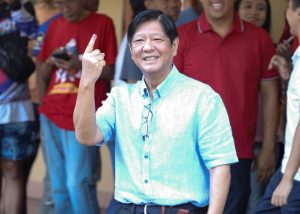The Armed Forces of the Philippines (AFP) Chief of Staff has disclosed that some retired officers have been agitating against the government of President Ferdinand “Bongbong” Marcos Jr., while in Congress, the House Speaker lashed out against key allies of the president.
On November 3, AFP Gen. Romeo Brawner Jr. ordered soldiers not to join activities aimed at undermining the Marcos government.
“Once we find out that any of the active personnel are involved (in destabilization), we will knock swiftly but judiciously,” he said.
“We know their purpose, so I’m warning my soldiers not to join any of these movements because those times are over and we want our country to move forward,” Brawner told the media.
A day after this was reported, Brawner clarified that there was no active plot against the government but only “some chatters of destabilization efforts.”
AFP spokesperson Col. Medel Aguilar added that the military chief “merely mentioned the reported efforts by certain individuals to upset the peace and stability that the country is enjoying right now.”
National Security Adviser Eduardo Año insisted that there was nothing alarming about the activities they monitored in the ranks of retired officers.
“There were healthy and passionate exchanges/debates among some retired or former military officers and even so…criticism against certain policies of the current administration, but they are within the bounds of our democratic space,” he said in a statement sent to local reporters.
Despite the assurance made by security officials, it is striking that they confirmed the existence of destabilization “rumors”, “chatters”, and “criticisms” of former military officers against the Marcos government, which is supposed to enjoy high public trust ratings.
News of the alleged destabilization was reported prior to Marcos’ departure to the United States, where he is expected to attend the ministerial meeting of the Asia-Pacific Economic Cooperation.
If unrest in the military is being denied, the infighting among allies of the Marcos government has already come out in the open.
When Congress resumed its sessions on November 6, House Speaker Ferdinand Martin Romualdez delivered a speech defending the institution against critics with “opportunistic motives.”
“(We) remain steadfast as we set our differences aside and become fiercely united whenever the institution we courageously devote our efforts to, or any individual member of this chamber for that matter, is being threatened by opportunistic motives that aim to distract us from fulfilling our mandate,” he said.
Romualdez added that the “politics of division has no place” in Congress as he warned against “certain sectors or individuals with misplaced priorities (who) choose to malign and tarnish the positive image of this very institution we labored hard to achieve.”
Last month, former President Rodrigo Duterte called Congress the “most rotten institution” after legislators removed the confidential funds that had been used by his daughter, Vice President Sara Duterte. He dared Romualdez and Congress to have their funds audited by the public, especially if the Speaker runs for president in 2028.
Rep. Sandro Marcos, the son of the president, noted in a plenary session that “some words were said to malign the reputation of our institution” but he didn’t mention a name. Romualdez also did not call out a particular person in his speech but Senior Deputy Speaker Dong Gonzales stated in the plenary deliberations that the insulting remarks against Congress were uttered by former president Duterte. After this, Gonzales, a party mate of Duterte, resigned from his political party.
A resolution was subsequently introduced to uphold “the integrity and honor of the House of Representatives and [express] appreciation, solidarity and support” for the House Speaker but its signatories did not include Deputy Speaker Gloria Arroyo, who is also a former president and an ally of the Dutertes. This led to Arroyo’s unceremonious removal as deputy speaker, even after she publicly stated that she continues to support the leadership of Romualdez.
The tension in the House will be reflected in the Senate this week, when it is expected to tackle the budget bill. Will Senators move for the restoration of Duterte’s confidential funds or will they uphold the House’s decision to transfer the controversial item to law enforcement bodies?
The realignment in the House leadership and even the destabilization rumors are telltale signs that Marcos’ “unity” government rests on fragile foundations.

































